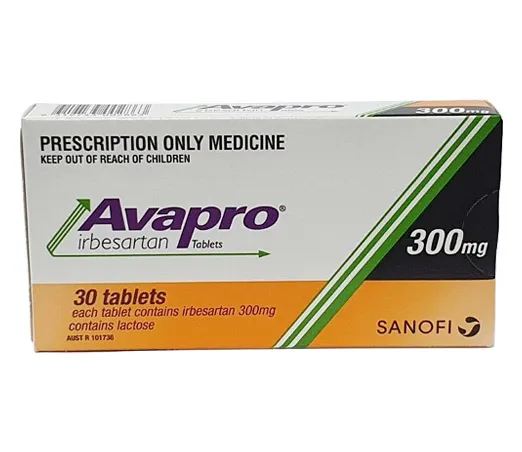Comprehensive Guide to Irbesartan: Uses, Dosage, Side Effects, and More
What is Irbesartan?
Overview of Irbesartan
Generic Name: Irbesartan
Brand Name: Avapro, generics
Drug Group: Angiotensin II receptor blocker (antihypertensive, renoprotective)
Commonly Used For
- Treat hypertension (high blood pressure).
- Manage diabetic nephropathy in type 2 diabetes.
- Reduce cardiovascular risk in at-risk patients.
Key Characteristics
Form: Oral tablets (75 mg, 150 mg, 300 mg) (detailed in Dosage section).
Mechanism: Selectively blocks AT1 receptors, inhibiting vasoconstriction and aldosterone release.
Approval: FDA-approved (1997 for Avapro) and EMA-approved for hypertension and nephropathy.

Indications and Uses of Irbesartan
Irbesartan is indicated for a variety of cardiovascular and renal conditions, leveraging its antihypertensive and renoprotective effects:
Hypertension: Lowers blood pressure in adults and children (6–16 years), per cardiology guidelines, supported by clinical trials showing a 10–15 mmHg reduction in systolic pressure.
Diabetic Nephropathy (Type 2 Diabetes): Slows progression of kidney disease by reducing proteinuria, recommended in nephrology protocols with evidence of delayed end-stage renal disease (ESRD).
Left Ventricular Hypertrophy: Investigated off-label to regress heart muscle thickening, improving cardiac function, with cardiology research.
Heart Failure: Managed off-label as an adjunct to ACE inhibitors in heart failure with preserved ejection fraction (HFpEF), with heart failure studies.
Stroke Prevention: Explored off-label in hypertensive patients with prior stroke, reducing recurrence risk, per neurology data.
Chronic Kidney Disease (CKD): Used off-label to protect renal function in non-diabetic CKD, with nephrology evidence.
Proteinuria Reduction: Initiated off-label in glomerulonephritis to reduce protein loss, with renal pathology studies.
Preeclampsia Prevention: Investigated off-label in high-risk pregnancies, with obstetrics research.
Atrial Fibrillation Management: Applied off-label to control blood pressure in AF patients, with electrophysiology data.
Metabolic Syndrome: Explored off-label to improve insulin sensitivity in metabolic syndrome, with endocrinology studies.
Dosage of Irbesartan
Dosage for Adults
Hypertension: Initial: 150 mg once daily, titrated to 300 mg once daily based on blood pressure response after 1–2 weeks.
Diabetic Nephropathy (Type 2 Diabetes): 300 mg once daily, with or without other antihypertensives, to maximize renoprotection.
Combination Therapy: 150–300 mg once daily with hydrochlorothiazide (12.5–25 mg) for resistant hypertension.
Dosage for Children (6–16 years)
Hypertension: 75 mg once daily for body weight 20–49 kg, titrated to 150 mg; 150 mg once daily for ≥50 kg, titrated to 300 mg, under pediatric cardiology supervision.
Dosage for Pregnant Women
Pregnancy Category D: Contraindicated in the second and third trimesters due to fetal toxicity; consult an obstetrician if used in the first trimester, with fetal monitoring.
Dosage Adjustments
Renal Impairment:
- Mild to moderate (CrCl >30 mL/min): No adjustment; monitor closely.
- Severe (CrCl <30 mL/min): Use cautiously; start at 75 mg daily.
Hepatic Impairment: Mild to moderate (Child-Pugh A or B): No adjustment; severe (Child-Pugh C): Use with caution due to limited data.
Concomitant Medications: Adjust if combined with potassium-sparing diuretics (e.g., spironolactone) or NSAIDs; monitor potassium levels.
Elderly: No specific adjustment; assess renal function and blood pressure response.
Volume Depletion: Start with 75 mg daily in patients with dehydration or on diuretics to avoid hypotension.
Additional Considerations
- Take this active ingredient once daily, with or without food, preferably at the same time each day.
- Avoid abrupt discontinuation to prevent rebound hypertension.
How to Use Irbesartan
Administration:
Oral: Swallow tablets whole with a full glass of water, with or without food.
Take consistently to maintain steady blood pressure control.
Timing: Administer at a fixed time daily, often in the morning, to align with monitoring schedules.
Monitoring: Watch for dizziness, swelling, or signs of hyperkalemia (e.g., muscle weakness); report changes immediately.
Additional Tips:
- Store at 15–30°C (59–86°F), protecting from moisture and light.
- Keep out of reach of children due to cardiovascular risk.
- Use a blood pressure monitor at home to track response, reporting readings <90/60 mmHg or >180/110 mmHg.
- Schedule regular lab tests (e.g., creatinine, potassium) every 1–3 months to assess renal and electrolyte status.
- Avoid excessive salt intake or dehydration to enhance efficacy.
Contraindications for Irbesartan
Hypersensitivity: Patients with a known allergy to Irbesartan or other ARBs.
Pregnancy (Second/Third Trimester): Contraindicated due to fetal renal toxicity and skull hypoplasia risk.
Severe Renal Artery Stenosis: Avoid due to potential worsening of renal perfusion.
Bilateral Renal Artery Stenosis: Contraindicated due to risk of acute kidney injury.
Hyperkalemia: Avoid in patients with uncontrolled potassium levels (>5.5 mmol/L).
Severe Hepatic Impairment: Contraindicated in Child-Pugh Class C due to limited metabolism data.
Warnings & Precautions for Irbesartan
General Warnings
Hypotension: Risk of symptomatic hypotension in volume-depleted patients; monitor blood pressure initially.
Renal Impairment: Risk of worsening kidney function; check creatinine and eGFR regularly.
Hyperkalemia: Risk with potassium supplements or salt substitutes; monitor potassium levels.
Fetal Toxicity: Risk of fetal malformations; discontinue if pregnancy is detected.
Angioedema: Rare risk; discontinue if swelling occurs.
Additional Warnings
Acute Kidney Injury: Risk in renal artery stenosis or severe dehydration; assess renal function.
Liver Dysfunction: Rare elevation of liver enzymes; monitor hepatic function.
Orthostatic Hypotension: Risk in elderly; advise slow position changes.
Aortic/Mitral Stenosis: Risk of reduced cardiac output; use cautiously.
Hypersensitivity Reactions: Rare anaphylaxis; stop if severe.
Use in Specific Populations
Pregnancy: Category D; avoid in later trimesters; monitor if used early.
Breastfeeding: Use caution; monitor infant for hypotension.
Elderly: Higher risk of renal decline; start with lower dose.
Children: Safe for hypertension with pediatric oversight.
Renal/Hepatic Impairment: Adjust or avoid in severe cases.
Additional Precautions
- Inform your doctor about kidney disease, liver issues, or pregnancy plans before starting this medication.
- Avoid potassium-rich diets or supplements without medical advice.
Overdose and Management of Irbesartan
Overdose Symptoms
- Hypotension, dizziness, or tachycardia.
- Severe cases: Bradycardia, renal failure, or shock.
- Nausea, weakness, or confusion as early signs.
- Coma or profound electrolyte imbalance with extremely high doses.
Immediate Actions
Contact the Medical Team: Seek immediate medical help.
Supportive Care: Monitor vital signs, provide IV fluids, and correct electrolytes if needed.
Specific Treatment: No specific antidote; use IV saline or vasopressors (e.g., norepinephrine) for hypotension.
Monitor: Check blood pressure, renal function, and potassium for 24–48 hours.
Additional Notes
- Overdose risk is linked to accidental over-ingestion; store securely.
- Report persistent symptoms (e.g., severe dizziness, swelling) promptly.
Side Effects of Irbesartan
Common Side Effects
- Dizziness (5–10%, managed with rest)
- Fatigue (3–7%, decreases with time)
- Hyperkalemia (2–6%, monitored with labs)
- Nausea (2–5%, relieved with food)
- Back Pain (1–4%, managed with posture)
These effects may subside with adaptation.
Serious Side Effects
Seek immediate medical attention for:
- Cardiovascular: Severe hypotension or syncope.
- Renal: Acute kidney injury or oliguria.
- Metabolic: Hyperkalemia (>6.0 mmol/L) or acidosis.
- Allergic: Angioedema or anaphylaxis.
- Hepatic: Jaundice or liver failure (rare).
Additional Notes
Regular monitoring with serum creatinine and potassium every 1–3 months is advised.
Patients with diabetes should monitor glucose, as ARBs may alter insulin sensitivity.
Report any unusual symptoms (e.g., swelling, dark urine) immediately to a healthcare provider.
Long-term use requires periodic renal ultrasound to assess kidney structure.
Drug Interactions with Irbesartan
This active ingredient may interact with:
- Potassium-Sparing Diuretics: Increases hyperkalemia risk (e.g., spironolactone); monitor levels.
- NSAIDs: Reduces antihypertensive effect and increases renal risk; use cautiously.
- Lithium: Raises lithium levels; monitor concentrations.
- ACE Inhibitors: Enhances hypotension risk; adjust doses.
- Aliskiren: Increases hyperkalemia and renal risk in diabetes; avoid combination.
Action: Provide your healthcare provider with a complete list of medications.
Patient Education or Lifestyle
Medication Adherence: Take this ARB as prescribed for hypertension or nephropathy, following the daily schedule.
Monitoring: Report dizziness, swelling, or signs of kidney issues immediately.
Lifestyle: Reduce salt intake; engage in moderate exercise to support blood pressure.
Diet: Avoid high-potassium foods if monitored for hyperkalemia.
Emergency Awareness: Know signs of hypotension or renal failure; seek care if present.
Follow-Up: Schedule regular check-ups every 1–3 months to monitor blood pressure, renal function, and electrolytes.
Pharmacokinetics of Irbesartan
- Absorption: Oral, peak at 1.5–2 hours; bioavailability ~60–80%.
- Distribution: Volume of distribution ~53–93 L; 90% protein-bound.
- Metabolism: Hepatic via glucuronidation to inactive metabolites.
- Excretion: Primarily biliary (80% as metabolites); renal (20%); half-life 11–15 hours.
- Half-Life: 11–15 hours, with steady-state at 3–4 days.
Pharmacodynamics of Irbesartan
This drug exerts its effects by:
Blocking AT1 receptors, preventing angiotensin II-induced vasoconstriction.
Reducing aldosterone secretion, lowering blood pressure and fluid retention.
Protecting kidneys by decreasing glomerular pressure in diabetic nephropathy.
Exhibiting dose-dependent risks of hypotension and hyperkalemia.
Storage of Irbesartan
- Temperature: Store at 15–30°C (59–86°F); protect from moisture and light.
- Protection: Keep in original container, away from heat and humidity.
- Safety: Store in a secure location out of reach of children and pets due to cardiovascular risk.
- Disposal: Dispose of unused tablets per local regulations or consult a pharmacist.
Frequently Asked Questions (FAQs)
Q: What does Irbesartan treat?
A: This medication treats high blood pressure and kidney disease.
Q: Can this active ingredient cause dizziness?
A: Yes, dizziness is common; report if severe.
Q: Is Irbesartan safe for children?
A: Yes, for hypertension with supervision.
Q: How is this drug taken?
A: Orally as tablets, once daily.
Q: How long is Irbesartan treatment?
A: Often long-term, with regular monitoring.
Q: Can I use Irbesartan if pregnant?
A: No, avoid in later trimesters; consult a doctor.
Regulatory Information for Irbesartan
This medication is approved by:
U.S. Food and Drug Administration (FDA): Approved in 1997 (Avapro) for hypertension and nephropathy.
European Medicines Agency (EMA): Approved for hypertension, diabetic nephropathy, and cardiovascular risk reduction.
Other Agencies: Approved globally for antihypertensive therapy; consult local guidelines.
References
- U.S. Food and Drug Administration (FDA). (2023). Avapro (Irbesartan) Prescribing Information.
- Official FDA documentation detailing the drug’s approved uses, dosage, and safety.
- European Medicines Agency (EMA). (2023). Irbesartan Summary of Product Characteristics.
- EMA’s comprehensive information on the medication’s indications and precautions in Europe.
- National Institutes of Health (NIH). (2023). Irbesartan: MedlinePlus Drug Information.
- NIH resource providing detailed information on the drug’s uses, side effects, and precautions.
- World Health Organization (WHO). (2023). WHO Model List of Essential Medicines: Irbesartan.
- WHO’s consideration of Irbesartan for hypertension.
- Journal of the American College of Cardiology. (2022). Irbesartan in Heart Failure.
- Peer-reviewed article on Irbesartan efficacy (note: access may require a subscription).
